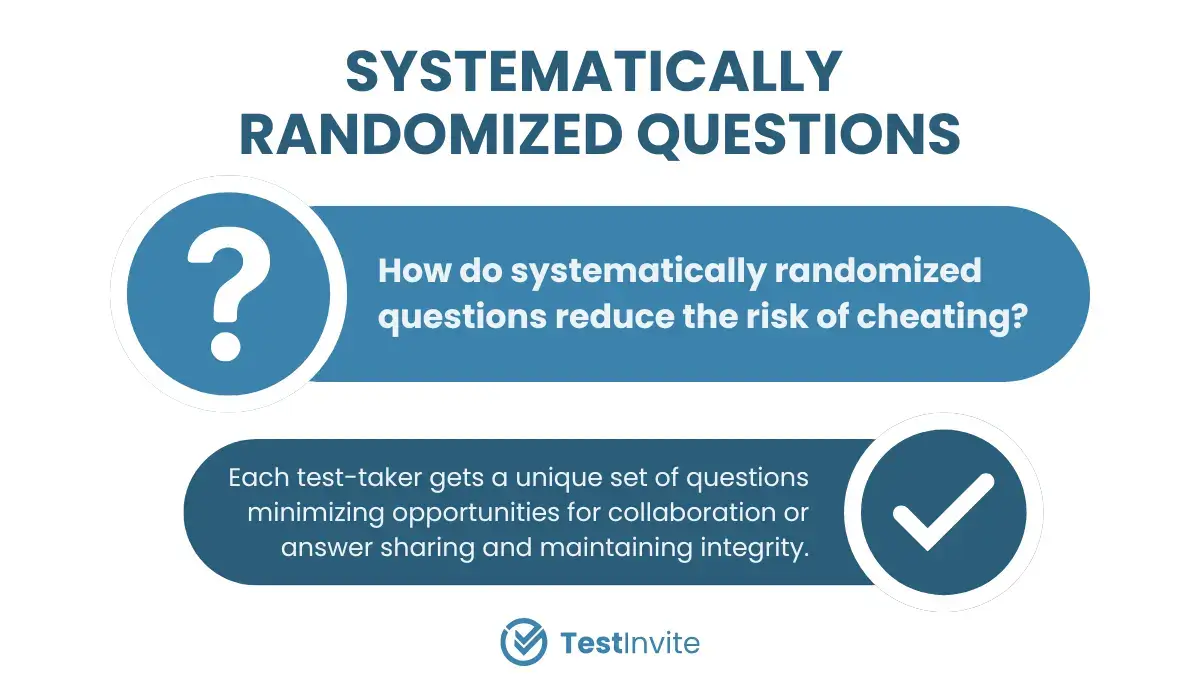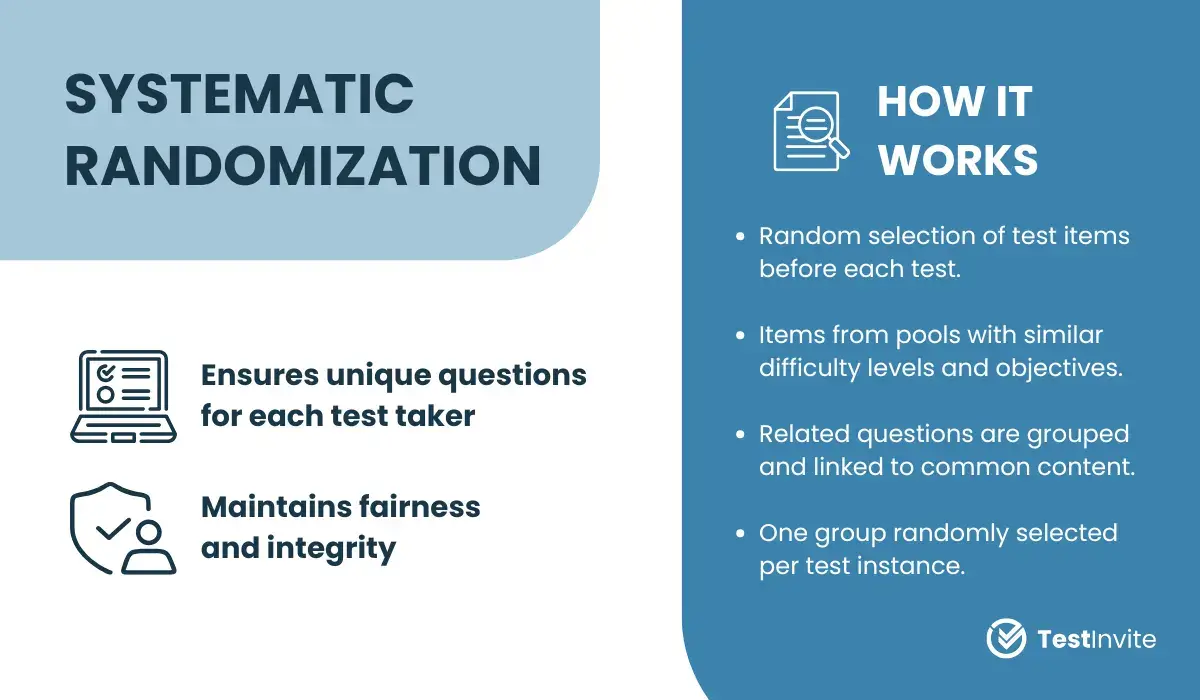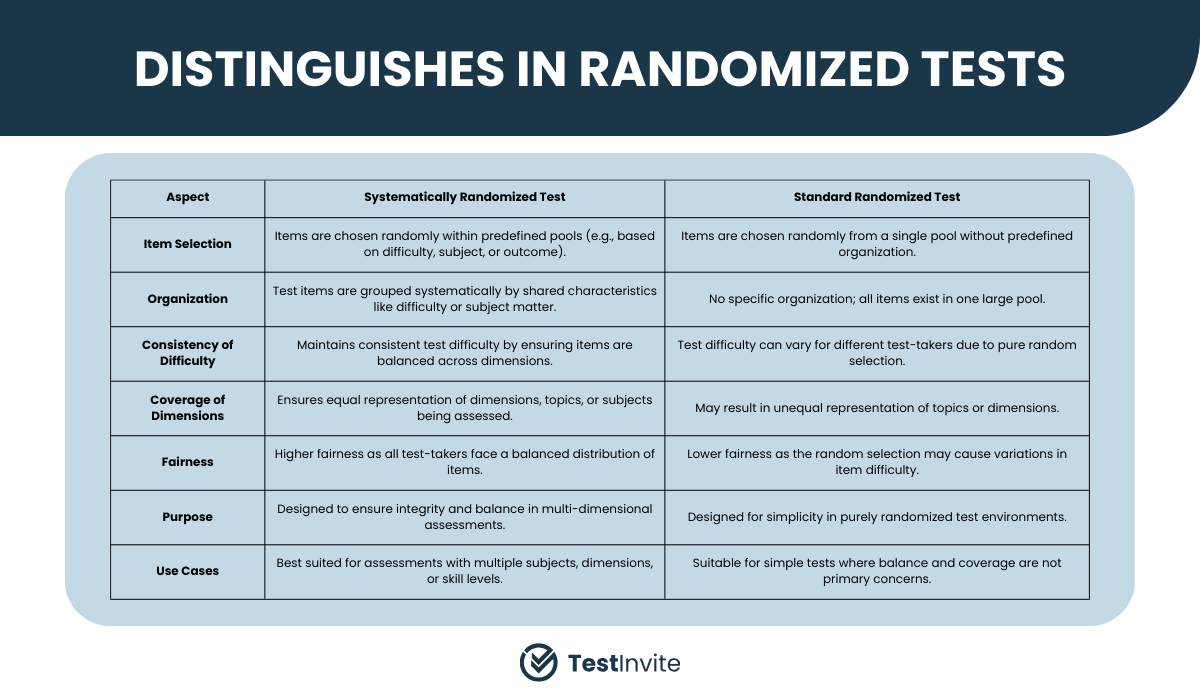All Resources

Systematically randomized questions are a method of designing and delivering tests to ensure fairness, reduce the risk of cheating, and maintain the integrity of the assessment process. Unlike traditional tests with a fixed set of questions, systematically randomized assessments involve a strategic and controlled random selection of test items. This approach helps prevent predictability, maintain fairness, and ensure the assessment's integrity.
One of the key advantages of systematic question randomization is their ability to reduce the risk of cheating. In traditional tests with a static question set, test-takers may share questions or answers with others, making it easier to compromise the assessment's integrity. However, with systematically randomized assessments, each test-taker encounters a unique set of questions, minimizing opportunities for collaboration or sharing of answers.

This approach not only fosters fairness but also strengthens the assessment's integrity by eliminating the possibility of individuals benefiting from prior knowledge of question sequences. It encourages a genuine demonstration of knowledge and skills, making systematically randomized assessments a valuable tool in various testing scenarios.
Systematically randomized assessments involve the random selection of test items for each test-taker immediately before the test begins. These test items are drawn from their respective pools of questions, all of which share similar difficulty levels and are aligned with specific learning objectives.
In cases where a set of related questions needs to be presented together, composite groups of questions are created. These groups are aligned with a common reading text, listening audio, or similar content. During each test instance, one group is randomly selected from each pool of these question groups to ensure a varied and fair assessment experience.

Systematically randomized assessments differ significantly from traditional online tests where the same set of questions is consistently presented.
In systematically randomized tests, questions are drawn from a pool of similar difficulty and learning outcome, but the specific questions presented to each test-taker are randomly selected just before they begin the test. This means that even if multiple individuals take the same assessment, they will likely receive a different set of questions, making it difficult to share answers or cheat.
On the other hand, traditional online tests always present the same questions in the same order to all test-takers. This predictability can make it easier for individuals to share answers or use unauthorized resources, compromising the test's integrity.
In summary, systematically randomized assessments enhance test security by randomizing the questions for each test-taker, whereas traditional tests rely on a fixed set of questions for all test-takers, making them more vulnerable to cheating.

Systematic randomization differs from standard randomized tests in the way it selects and presents test items to test-takers. In a systematically randomized assessment, test items are organized into pools or groups based on shared characteristics, such as difficulty level or targeted learning outcomes.
Each test-taker is then presented with test items that are randomly chosen from these predefined pools. This approach ensures that each dimension or subject being assessed is represented by an equal number of questions and that the overall difficulty of the test remains consistent.
On the other hand, in a standard randomized test, questions are selected randomly from a single pool without any predefined grouping or systematic organization. This can lead to variations in the difficulty of the test for different test-takers and may not guarantee an equal representation of different dimensions or subjects.
Systematic randomization is employed to maintain the integrity and fairness of assessments, especially when assessing multiple dimensions or subjects within a single test.
Systematically randomized assessments play a crucial role in maintaining integrity in the assessment process through several key mechanisms:
In summary, systematically randomized assessments contribute to maintaining integrity by promoting fairness, reducing opportunities for cheating, and enhancing the overall security and unpredictability of the assessment process. These measures help ensure that the assessment accurately measures the knowledge and abilities of test-takers while minimizing potential breaches of integrity.
Systematically randomized assessments ensure fairness by carefully structuring the randomization process to maintain consistency and equal representation of various dimensions, subjects, or learning outcomes being assessed. Here's how they achieve fairness:
Overall, systematic randomization enhances the fairness and integrity of assessments by promoting consistency, equal representation, unpredictability, and a well-rounded evaluation of test-takers' performance.
Systematically randomized assessments are particularly valuable when the goal is to safeguard the fairness and integrity of the assessment, minimizing the risk of misleading results. These assessments help protect against cheating and ensure that test-takers' scores accurately represent their actual knowledge and abilities, thereby upholding the credibility and validity of the assessment process. They can be employed in various scenarios:
In summary, systematically randomized assessments are valuable in scenarios where fairness, security, and balanced content coverage are critical. They ensure that each test-taker receives a unique but equitable assessment experience.
Systematically randomized assessments have a wide range of use cases where fairness, reduced cheating risk, and maintained assessment integrity are essential. Some of the most common use cases include:
These use cases demonstrate the versatility and importance of systematically randomized assessments across education, professional certification, recruitment, compliance, and various other domains where fairness and assessment integrity are paramount.